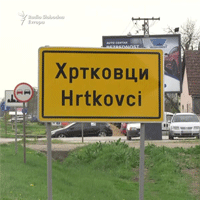(srpski) Osuđeni general Lazarević predvodio „Besmrtni puk“ u Nišu: Na Dan pobede nad fašizmom, Srbija promoviše ratne zločince
Sorry, this entry is only available in srpski.

Sorry, this entry is only available in srpski.
Sorry, this entry is only available in srpski.
Sorry, this entry is only available in srpski.
 When activists protested against an event organised by the ruling party promoting a convicted war criminal, we were fined – showing again how Serbian officials still reject the truth about the 1990s conflicts.
When activists protested against an event organised by the ruling party promoting a convicted war criminal, we were fined – showing again how Serbian officials still reject the truth about the 1990s conflicts.
In November 1991 in Vukovar in Croatia, around 260 people were killed in what is known as the Ovcara massacre. On Tuesday, we who raised our voices against the perpetrators of this crime were fined by a Serbian court.
Sorry, this entry is only available in srpski.

On April 11 2018, the Appeals Chamber of the Mechanism for International Criminal Tribunals (MICT) in The Hague passed sentence with its final verdict on the President of the Serbian Radical Party (SRS), Vojislav Šešelj, and reversed his acquittal by the International Criminal Tribunal for the former Yugoslavia Trial Chamber, sentencing him to 10 years of imprisonment for encouraging persecution (forced displacement), deportation, and other inhumane acts (forcible transfer), as crimes against humanity, and for committing persecutions in Hrtkovci in Vojvodina (violations of the right to security) as a crime against humanity. The Humanitarian Law Center (HLC) considers such a judgement significant, since in this way the victims of deportation and persecution in Hrtkovci almost 26 years ago have received judicial satisfaction; however, justice has only been partially satisfied, given the scope of the indictment against Šešelj, which encompasses the area of Sarajevo, as well as the municipalities of Zvornik, Nevesinje and Mostar in BiH, and Vukovar in Croatia.
 In anticipation of the closing of the ICTY, there has been plenty of discussion, including at EJIL: Talk! (see here), on the court’s impact in the former Yugoslavia, particularly relating to the public’s acceptance of ICTY findings and reconciliation. I’d like to contribute to this discussion with findings from the most recent public opinion survey conducted in Serbia – published in December 2017 (“Awareness of citizens of Serbia about the wars of the ‘90s, war crimes and war crimes trials” designed by the Humanitarian Law Center, commissioned by the Serbian daily Danas and conducted by Demostat – available only in Serbian here).
In anticipation of the closing of the ICTY, there has been plenty of discussion, including at EJIL: Talk! (see here), on the court’s impact in the former Yugoslavia, particularly relating to the public’s acceptance of ICTY findings and reconciliation. I’d like to contribute to this discussion with findings from the most recent public opinion survey conducted in Serbia – published in December 2017 (“Awareness of citizens of Serbia about the wars of the ‘90s, war crimes and war crimes trials” designed by the Humanitarian Law Center, commissioned by the Serbian daily Danas and conducted by Demostat – available only in Serbian here).
The latest survey mostly confirms what we already know from those previously conducted – revisionism and denialism are prevalent, and ethnic bias is entrenched – but it also provides additional information about these phenomena.
Sorry, this entry is only available in srpski.
Sorry, this entry is only available in srpski.
Sorry, this entry is only available in srpski.